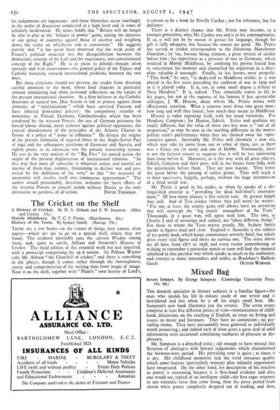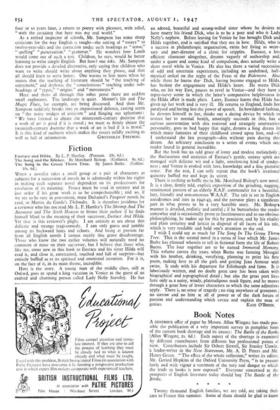Mixed Bag
THE donnish specialist in literary subjects is a familiar figure—the man who spends his life in minute study of one writer and is bewildered and lost when he is off his single small beat. Mr. Sampson's new book illustrates just the reverse. The seven essays comprise at least five different points of view—reminiscences of child- hood, discussions on the teaching of English, an essay on Irving and essays on music and literature. They have no connection ; no pre- vailing theme. They have presumably been gathered as individually worth preserving ; and indeed each of them gives a great deal of solid information with occasional stimulating outbursts of pleasure or dis- pleasure.
Mr. Sampson is a detached critic ; old enough to have missed that flirtation of ideologies with literary judgements which characterised the between-wars period. His prevailing tone is quiet ; at times it is dry. His childhood memories lack the vivid sensuous quality which some hunters (particularly women) after infantile impressions have recaptured. On the other hand, his description of his reaction to poetry is interesting because it is first-hand evidence and also, one would say, typical of an intelligent child—the first eager response to any romantic verse that came along, then the prose period from eleven when poetry completely dropped out of reading, and then, four or so years later, a return to poetry with pleasure, with relief, " with the certainty that here was my real world."
As a retired inspector of schools, Mr. Sampson has some sharp criticisms for the way English is taught—the setting of " essays " to twelve-year-olds and the correction under such headings as " sense," " spelling" " punctuation," " grammar." He wonders how Lamb would come out of such a test. Children, he says, would be better learning to write simple English. But how? one asks. Mr. Sampson does not provide a detailed alternative, only saying that children who want to write should write about anything- they please, and that all should learn to write letters. One warms to him more when he insists that the teaching of literature should be " the teaching of enjoyment," and deplores I he " conscientious " teaching under sub- headings of " types," " origins " and " movements."
Here and there all through this sober prose there are sudden small explosions. The landscape is quiet. Mozart's life and The Magic Flute, for example, are being discussed. And then Mr. Sampson suddenly breaks into an impassioned defence, casting scorn on " the noisy midges of criticism " and flinging out aphorisms : " We have learned to abjure the nineteenth-century doctrine that a work of art is good if it is moral ; we must as firmly abjure the twentieth-century doctrine that a work of art is bad if it is moral." It is this kind of outburst which makes the essays mildly exciting as



































 Previous page
Previous page